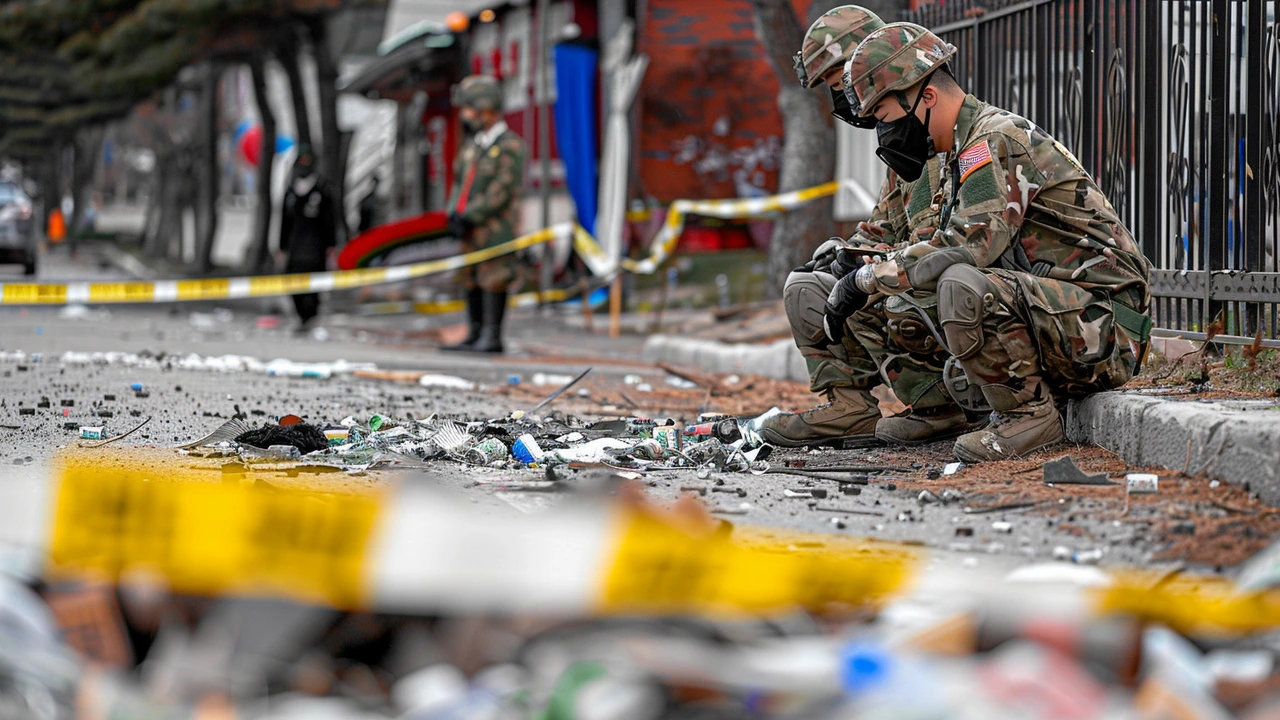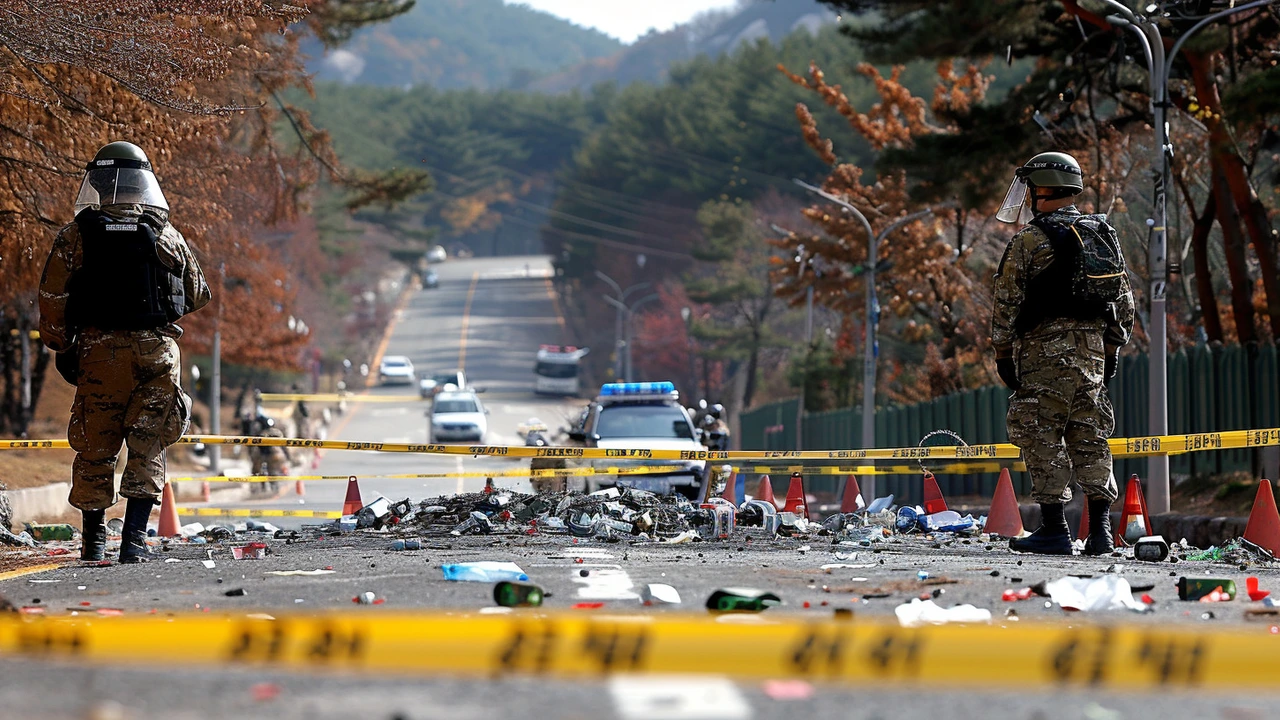South Korea to Suspend Key Military Agreement with North Korea
South Korea's National Security Council has decided to take a decisive step in suspending a crucial 2018 military agreement with North Korea due to recent provocations from the northern neighbor. North Korea has been sending hundreds of balloons filled with trash and animal waste over the border, an action that South Korea perceives as a direct challenge to its military readiness and national security.
The council announced its decision over the weekend, stating that adhering to the agreement in light of these provocations would pose significant challenges to the country's military preparedness. The proposal is set to be presented for cabinet approval on Tuesday. Should the proposal receive the green light, it would enable South Korea to resume military drills near the demilitarized zone (DMZ) and take immediate measures if necessary.
Backdrop: The 2018 Military Agreement
The 2018 military agreement was one of the key outcomes of historic inter-Korean meetings during Moon Jae-in's presidency. The pact aimed to reduce military tensions by creating buffer zones along the border and suspending various military exercises. The agreement was seen as a significant step toward improving relations and easing hostilities on the Korean Peninsula.
However, the agreement's effectiveness has been under scrutiny following several provocations from North Korea, including the launch of a spy satellite last year, which led to a partial freeze of the accord. Relations between the two Koreas have only worsened since then, with the recent balloon campaign adding fuel to the fire.

The Balloon Campaign: A New Low in Inter-Korean Relations
Since last week, North Korea has launched hundreds of balloons filled with trash and animal waste over the heavily fortified border. Dubbed “gifts of sincerity,” these balloons have sparked outrage in the South. North Korean leader Kim Jong Un’s sister, Kim Yo Jong, has defended these actions, citing the North Koreans' freedom of expression. However, Pyongyang announced on Sunday that it would cease the balloon campaign, acknowledging its effectiveness in countering South Korean propaganda.
The balloon campaign is North Korea’s retaliation against balloons sent from the South carrying anti-Pyongyang propaganda leaflets, cash, food, and USB drives packed with South Korean dramas and popular music. These items aim to make their way into the hands of North Korean citizens, spreading information and culture from the South.
South Korea's Response
The South Korean National Security Council's decision to propose the suspension of the 2018 military agreement reflects the extent of concern in Seoul. A presidential official indicated that South Korea might also consider resuming loudspeaker propaganda campaigns along the border. These campaigns, which were halted as part of the 2018 agreement, targeted Kim Jong Un personally and were highly provocative.
Suspending the accord allows the South Korean military to conduct more frequent and larger-scale exercises near the DMZ. The intention is to bolster the nation's defensive capabilities and demonstrate a robust stance against North Korean provocations. Additionally, the suspension could pave the way for other military measures that have not been specified publicly.

Implications for Future Relations
The suspension of the 2018 military agreement signifies a critical point in inter-Korean relations. Many had hoped the agreement would lead to lasting peace and stability on the peninsula. However, recent events have shown that North Korea's leadership remains unpredictable and unyielding.
Resuming military activities and potentially loudspeaker campaigns will likely increase tensions between the two countries. It's a stark reminder of the fragile nature of peace efforts and the deep-seated mistrust that persists. These moves may lead to further escalation, as both sides respond to perceived threats.
Historical Context and Future Prospects
The Korean Peninsula has long been a focal point of international concern due to its history of conflict and the threat posed by North Korea's nuclear capabilities. The 2018 military agreement was a beacon of hope, suggesting that the two Koreas could find common ground and work towards peace. However, the agreement's current state highlights the complexities and challenges inherent in achieving lasting reconciliation.
Looking ahead, the international community will be closely watching how the situation unfolds. There is always the potential for diplomatic interventions from global powers such as the United States and China, both of whom have vested interests in maintaining stability in the region. South Korea's actions will also be scrutinized for their impact on regional security and international diplomacy.
The suspension of the military agreement is a significant development, and its ramifications will likely be felt for some time. It underscores the volatile nature of inter-Korean relations and the ongoing struggle to balance military readiness with the pursuit of peace and stability on the Korean Peninsula.






Dawn Waller
June 3, 2024 AT 21:17Oh wow, another balloon of "sinceriy"-what a groundbreaking diplomatic move!!! Who needs peace when you can have floating trash art installations???. #InnovativeForeignPolicy
Grace Melville
June 3, 2024 AT 22:40North Korea's balloon stunt is a clear escalation; diplomatic channels should stay open 😊.
Ashlynn Barbery
June 4, 2024 AT 00:03In light of the recent provocations, it is advisable for policymakers to consider a calibrated response that upholds the principles of deterrence while preserving avenues for dialogue. A measured suspension of the 2018 accord, coupled with transparent communication to allies, may serve both security interests and the broader goal of regional stability.
Sarah Graham
June 4, 2024 AT 01:27Peaceful engagement should always be the priority.
Jauregui Genoveva
June 4, 2024 AT 02:50Honestly, sending garbage balloons is a disgrace 😠-it signals that even basic respect for human dignity has been abandoned. If this is the pinnacle of "sincere gifts," we must call it out for what it is: a toxic show of contempt.
naman sharma
June 4, 2024 AT 04:13One must ask whether the balloon campaign is merely a smokescreen orchestrated by hidden forces seeking to justify an increased militaristic posture in the peninsula. The timing aligns suspiciously with undisclosed foreign intelligence operations, suggesting a deeper strategic manipulation at play.
Quinten Squires
June 4, 2024 AT 05:37The balloon affair is just another example of how provocations keep getting recycled and fed into the media cycle it seems every time there’s a lull the North finds a new way to grab attention this time with waste flying over the DMZ the question is how long can South Korea keep restraining its response without endangering its own forces and credibility the government’s choice to suspend the 2018 agreement might be seen as a necessary step but it also risks escalating tensions further especially if loudspeaker propaganda resumes the balance between showing resolve and avoiding unnecessary flare‑ups is delicate
Tyler Manning
June 4, 2024 AT 07:00The Republic must assert its sovereign right to defend its territory without capitulating to Pyongyang's frivolous theatrics. A resolute stance, grounded in unequivocal national interest, is indispensable for preserving our security architecture.
james patel
June 4, 2024 AT 08:23From a strategic stability framework, the suspension of the 2018 inter‑Korean confidence‑building measures reintroduces a higher operational readiness posture, thereby recalibrating the deterrence equilibrium along the 38th parallel.
Scarlett Mirage
June 4, 2024 AT 09:47We stand at the crossroads of moral decay and geopolitical theater!!! The balloons, laden with refuse, are not mere parcels but symbolic indictments of a regime that equates oppression with generosity!!! One must contemplate the ethical abyss that permits state‑sponsored waste to become a diplomatic instrument!! The 2018 accord, once a beacon of hope, now lies tarnished by the very actors who once vowed restraint!! It is a paradox that those who claim to cherish sovereignty resort to childish sabotage of the environment!! Yet, perhaps this is the inevitable consequence when dialogue is replaced by garbage‑filled sky‑sentiments!! The South Korean decision to suspend the agreement is a necessary reclamation of agency in a theatre of absurdity!! It signals to the international community that tolerance has limits and that accountability must rise!!! In the grand tapestry of history, such provocations will be recorded as footnotes to the larger narrative of peace‑seeking peoples!! The moral calculus must weigh the dignity of citizens against the theatrics of a regime unwilling to engage in genuine discourse!! Let us not be swayed by melodramatic gestures that masquerade as sincerity!! Instead, we must champion transparent, fact‑based strategies that reaffirm our commitment to security and human dignity!! The path forward demands both firmness and compassion, a duality rarely mastered but ever essential!! In conclusion, the suspension is not a regression but a strategic pivot toward a more resilient and principled posture!!! Future generations will judge us by the firmness of our resolve today!!!